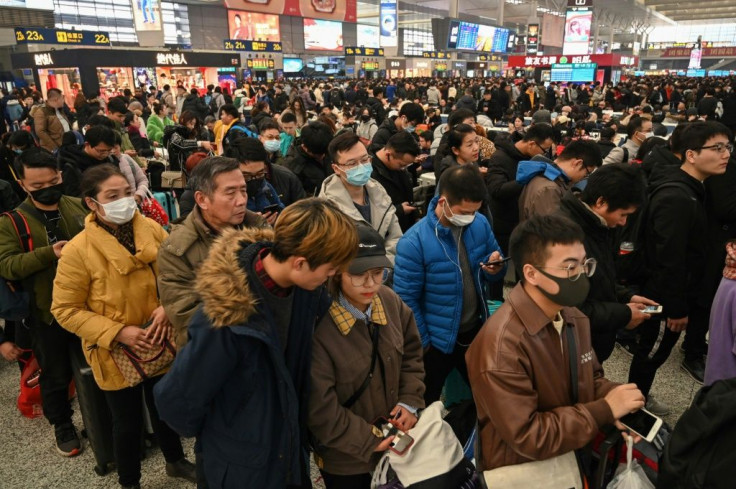Chinese Stock Markets Plunge As Deadly Virus Spreads, Authorities Order Lockdowns

KEY POINTS
- Shanghai Composite index plunged 2.75% on Thursday.
- Three cities are in lockdown or about to be,
- Chinese authorities virus will spread as hundreds of millions of people will travel during long holiday
Chinese stocks plunged almost 3% on Thursday as a deadly outbreak of a coronavirus has placed three of its large cities under quarantine, killed at least 17 people and infected at least 600 others.
The Shanghai Composite index plunged 2.75% -- the worst performance at the end of a lunar year in its three-decade history -- while the Shenzhen Composite plummeted 3.45%. Hong Kong’s Hang Seng index dropped 1.52%.
Investors sold off shares on fears the virus will continue to spread ahead of a Lunar New Year holiday (also called the Spring Festival).
The virus was believed to have originated in the city of Wuhan, which is now under lockdown, with transportation shut down and numerous public events canceled. Two other cities, Huanggang and Ezhou, are also planning severe restrictions on public movement and activities.
On the Shanghai Composite index, more than 90% of 4,000 Mainland Chinese-based stocks fell on trading volumes that were 20% above the average. Foreign traders sold off a record $1.7 billion worth of Chinese shares through trading links with Hong Kong.
“Fear and panic are rampant,” said Wang Daixin, a fund manager at Bristlecone Pine Asset Management Ltd. “It’s hard to tell how bad things will get before a turn for the better. I didn’t get out [of the market] when I had the chance to, so now I might as well sit it out rather than lose money. Others are offloading [shares] at whatever cost.”
The Chinese sectors most likely to be impacted by virus fears are tourism, retail sales, and airlines, said Seema Shah, chief strategist at Principal Global Investors. "Healthcare and pharmaceuticals are clear beneficiaries," she added.
Indeed, airline stocks dropped Thursday -- Air China was down 4.4%, China Eastern Airlines fell 3.4%, and China Southern Airlines shed 3.7%.
And since the Shanghai Stock Exchange will be closed for the Lunar Year holiday through next Thursday, foreign investors will be unable to accurately assess the value of their Chinese equity holdings.
“There’s going to be no way for investors to make a decision or change positions until post-Chinese New Year,” said Gavin Parry, chief executive at Parry Global Group in Hong Kong. “Either you’re going to have last minute moves [Thursday] to get positions in place and take them off, or when we come back -- we’re going to get some decent volatility then.”
Larry Hu, an economist at Macquarie Capital Ltd., said Asian markets are haunted by memories of the severe acute respiratory syndrome, or SARS, outbreak of 2002-2003.
“The bad news is that the worst is yet to come,” he wrote. “ The lesson from SARS suggests that the turning point for sentiment will come only after the number of new infections starts falling. We can’t answer how severe it will be and when it will end.”
Li Shiyu, managing director at Guangdong Xiaoyu Investment Management Co., said a key indicator will be the number of the new cases.
“The epidemic may reach a peak in two weeks and hopefully start to slow,” he said. “I may cut my [stock] positions given the market will be under pressure. If there is a trend for new cases to decline, I would consider buying shares again.”
David Roche, president & global strategist of Independent Strategy said on Thursday: “we don’t really know the characteristics of this virus yet. In order to get a pandemic, you really have to have a virulent infection to be exponential. Many of these new cases are due to much tighter reporting, not necessarily a rate of infection. So we really don’t know to what extent the rate of contagion.”
Peter Garnry, head of equity strategy at Saxo Bank, warned that the coronavirus is worse than expected.
“What the market is trying to price in is what is the economic cost,” he added.
© Copyright IBTimes 2025. All rights reserved.





















